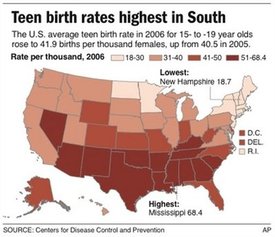South leads nation in teen births
 The birth rate for teens rose in more than half of the states in the United States in 2006, with the biggest increases seen in the South and Southwest, new research shows. The U.S. Centers for Disease Control and Prevention released its latest findings Wednesday on teen birth rates in the United States.
The birth rate for teens rose in more than half of the states in the United States in 2006, with the biggest increases seen in the South and Southwest, new research shows. The U.S. Centers for Disease Control and Prevention released its latest findings Wednesday on teen birth rates in the United States.
Mississippi has the highest teen birth rate in the nation, a figure more than three times higher than the states with the lowest rates, according to CDC health officials. The state had a rate of 68.4 births per 1,000 women ages 15 to 19 in 2006, a 13 percent increase over 2005. Nationally, the average teen birth rate is 41.9 births per 100,000, a 3 percent change from 2005 when it was 40.5.
According to the CDC, teen birth rates were highest in the South and Southwest and lowest in the Northeast. New Mexico (a rate of 64.1 per 1,000) and Texas (63.1) were next on the list after Mississippi. Rounding out the rest of the top ten were Arkansas, Arizona, Oklahoma, Nevada, Tennessee, Kentucky and Georgia.
The findings were published in "Births: Final Data for 2006" based on a review of all the birth certificates in 2006. Significant increases in teen birth rates were noted in 26 states. Some experts argue that one factor in the recent increase has been the Bush administration's federal funding for abstinence-only education that does not teach teens how to use condoms and other contraception. Other factors may include the increasing cost of some types of birth control and their unavailability in poor and minority communities.
According to Felicia Brown Williams, director of the Mississippi public affairs program of Planned Parenthood of Alabama, one reason for the increase in Mississippi is the state's high poverty rates, reports the Mississippi Hattiesburg American. Studies show residents of higher poverty areas have less access to basic health care. "That means less access to birth control and less access to information and treatment regarding sexually transmitted infections," she told the Mississippi Hattiesburg American. "Studies show that abstinence-only programs don't reduce the number of teen pregnancies or sexually transmitted infections. Abstinence-only programs deny teenagers medically accurate and complete information about birth control and sexually transmitted infections."
